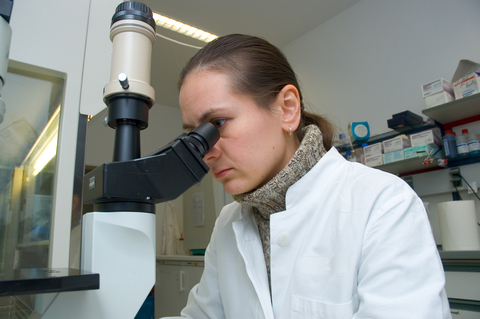Abingdon Health to develop test for mastitis in dairy cows

Abingdon Health, a tenant at the University of Birmingham’s bio-incubator, is developing a rapid diagnostic test for bovine mastitis, a common and serious health problem in dairy cows, which has an estimated £14-23bn impact on the global dairy industry.
Mastitis is usually caused by bacterial infection in the cow’s teats or udder. It reduces the quality of milk, rendering it unsaleable, and can be fatal to the cow. It is a problem for dairy farmers around the globe, for example in India where there are 43,600,000 dairy cows making up 16.5% of the global dairy cow population. Currently mastitis is detected by visual inspecting the milk, and the type of infection is confirmed by sending it off for laboratory testing, which is time consuming and expensive.
The University of Birmingham’s relationship with Abingdon Health started in 2010, when a joint venture resulted in a new start up company called Serascience, who developed Seralite, the world’s first rapid test for multiple myeloma. The test is used in human healthcare and is now available in seventy countries worldwide.
The University of Birmingham reports Abingdon’s diagnostic test for mastitis will be based on a lateral flow technology that can be used on the farm, to identify the type of bacteria that caused the infection. Test results will ensure that the cow is quickly prescribed the right antibiotic to treat the infection, and it is expected that this will reduce the inappropriate use of antibiotics, and the spread of disease between cattle in milking herds.
Dr David Pritchard, Chief Technical Officer of Abingdon Health Ltd, said “The pressure to reduce the use of antimicrobials in food production is growing rapidly. To do this, we need to provide farmers with rapid diagnostic tests that guide the choice of antibiotic, and ensure animals are treated quickly and effectively with the right antibiotic. We also believe this test will provide benefits to the dairy industry in terms of milk quality and yield, and to the cattle in terms of animal welfare.”
The development of the diagnostic test has been funded by an £805,000 grant from Innovate UK, the UK’s innovation agency. The test will be developed in partnership with the University of Glasgow, and will combine the diagnostic assay development expertise of Abingdon with the animal health and biomarker knowledge of the University of Glasgow to develop a highly sensitive and specific assay with the ability to stratify mastitis by bacterial class (gram-negative or gram-positive), therefore offering fast, on-farm decision making about antimicrobial treatment of cows with mastitis and providing an opportunity to reduce antimicrobial use whilst safeguarding cow health.








